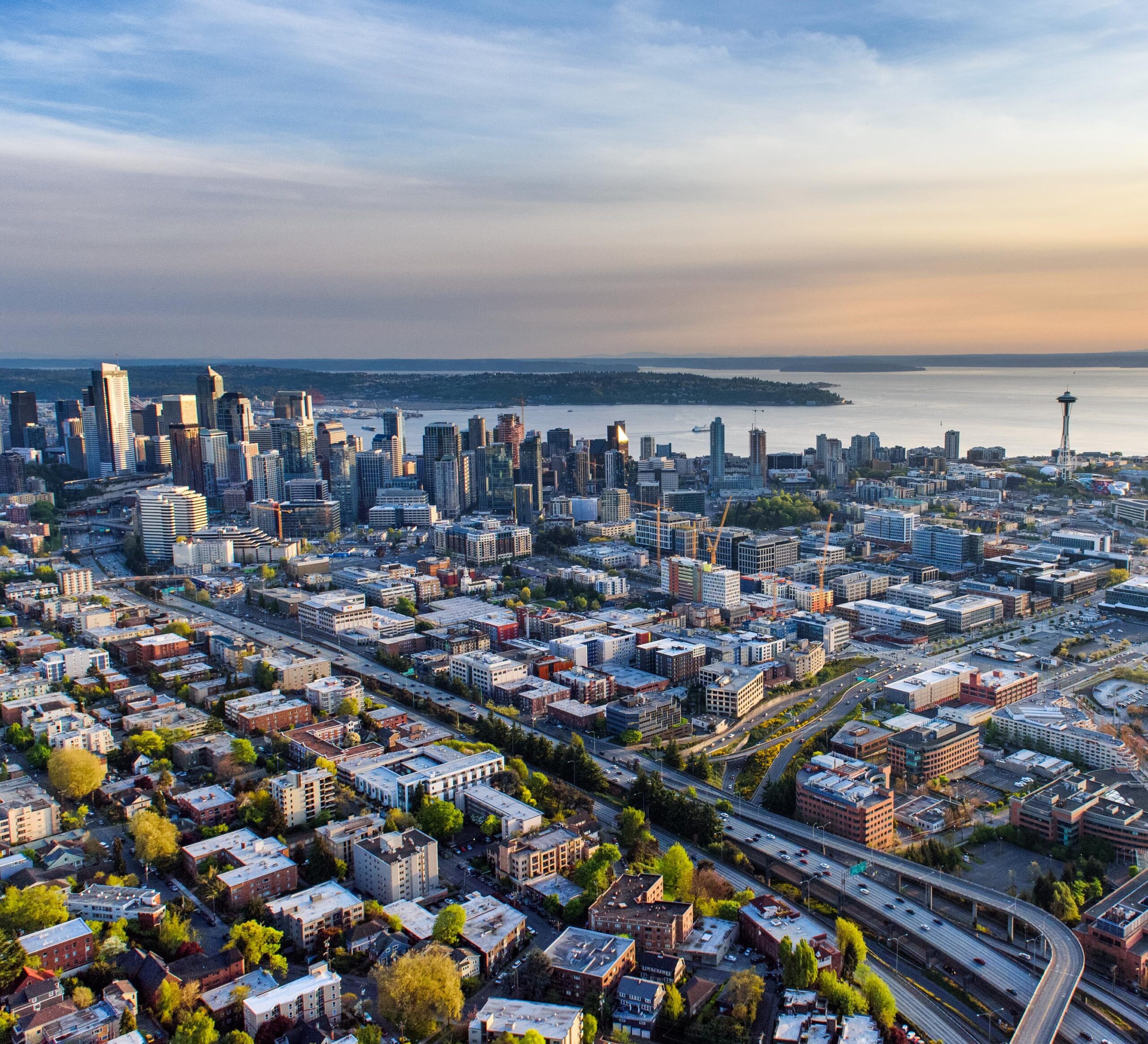
Plan would increase capacity to 330,000 units focused on common-sense approach allowing needed new kinds of housing in new places
Mayor’s plan promotes bold vision focused on affordability, family-sized housing, and livable communities
Seattle – Today, Mayor Bruce Harrell shared details of the One Seattle Comprehensive Plan Update, along with the release of proposed zoning maps. This updated plan builds on the draft plan released earlier this spring for public feedback.
“To bring down costs, support current residents, and prepare for future growth, Seattle needs more housing and more housing choices – it’s that simple. Looking at the data and at our neighborhoods, we designed this plan to thoughtfully add housing diversity and capacity at the scale that is necessary to make a difference,” said Mayor Harrell. “This once-a-decade opportunity to update our Comprehensive Plan allows us to center our values and strategically envision the future of our city. As this plan moves forward, we will continue to advance our One Seattle Housing Agenda focused on lowering housing costs, ensuring families and workers can live in our city, preventing displacement, making it easier to build, and addressing root causes of our homelessness crisis.”
The growth strategy and targeted zoning changes are focused on housing affordability, expanding family-sized housing, and creating livable communities. Key elements of the proposed update include:
Lowering Housing Costs, Improving Affordability, and Preventing Displacement
- Mayor Harrell’s proposal increases zoning capacity to over 330,000 new units, more than doubling the city’s housing capacity, exceeding the growth targets set out by the Growth Management Act, and focusing on expanding housing supply. Understanding current cost pressures and anticipated growth, increasing capacity for more housing is essential for lowering housing costs and increasing affordability.
- The plan includes an Affordable Housing Bonus, which provides additional height and unit capacity for affordable housing projects within .25 miles of frequent transit. This bonus would generally support twelve units on a typical 5,000 square foot lot in Neighborhood Residential areas if at least 50% of the units are affordable to low-income households.
- The proposal expands the Mandatory Housing Affordability (MHA) program in areas that will experience a significant
- Mayor Harrell is committed to helping keep neighbors in their longstanding communities, and the proposal includes a robust anti-displacement strategy. With a focus on historically marginalized and vulnerable communities, strategies include historic investments in community-driven development and the Equitable Development Initiative, strong renter supports and protections, and more, including new legislation to prevent predatory homebuying.
Ensuring Seattle Is a Great Place for Families
- More middle housing is an important tool to meet the needs of current and future residents with family-sized units, more homeownership opportunities, and homes near convenient amenities like parks, schools, and more. Young adults make up about one-third of Seattle’s total population and need more starter homes for raising families.
- The plan allows for duplexes, triplexes, and quadplexes across all Neighborhood Residential zones, implementing HB 1110 – a bill adopted by the Washington State Legislature last year allowing for a broader range of middle housing types – and creating more family sized housing in all neighborhoods across the city.
- Increases capacity for middle housing from 16,000 to 94,000 units of housing, totaling a quarter of overall capacity.
- This proposal includes a first-of-its-kind Stacked Flat Incentive, aiming to make development of these types of multifamily projects feasible.
Creating Livable, Convenient, and Walkable Neighborhoods
- At the center of the mayor’s plan is a focus on transit-oriented development, livable communities, and convenient access to amenities and everyday needs within a short walk, bike, or transit trip. The plan advances an array of approaches to increase housing capacity tailored to the specific features of Seattle’s neighborhoods.
- The plan would increase density along frequent transit routes to prioritize growth with expanded access to transit options, accommodating 37,000 new homes.
- The proposal would designate 30 Neighborhood Centers across that city – a new zoning type that adds increased housing close to existing businesses and amenities – allowing for 30,000 new homes in neighborhoods near transit and amenities.
- The plan adds a new Urban Center at the upcoming 130th Street Light Rail Station and expands the boundaries of several urban centers – dense areas with a wide range of housing, jobs, shops and services, and access to regional or local transit.
- The proposal allows corner stores throughout Neighborhood Residential areas, supporting new small businesses and complete neighborhoods where residents can easily meet everyday needs.
- In his 2025-2026 budget proposal, Mayor Harrell announced funding for a supplemental environmental impact statement to identify new housing opportunities in regional and urban centers, places already primed to support dense, walkable communities.
- Updated tree planting requirements in Neighborhood Residential Zones that creates an incentive to encourage the planting of larger species of trees and waives parking requirements to save existing trees.

“Mayor Harrell’s One Seattle Plan lays the groundwork for a city that fosters community resilience and boldly increases our capacity to build more homes for generations to come,” said Rico Quirindongo, Director of Seattle’s Office of Planning and Community Development. “By centering effective anti-displacement strategies, creating opportunities for more affordable, accessible, and age-friendly housing types, we can support residents to stay in the communities they love, while welcoming new families to our vibrant neighborhoods. This plan reflects our commitment to building a vibrant and more equitable city.”
Through an expansive One Seattle Housing Agenda, Mayor Harrell continues to drive progress to support more affordable housing and greater housing production in the city. In addition to the One Seattle Plan which will add new housing opportunities throughout the entire city, efforts include boosting the production of accessory dwelling units (ADUs); passing legislation to allow for more micro-housing opportunities; establishing a design review holiday to encourage more residential developments in downtown; passing new incentives for office-to-residential conversions; advancing a new redevelopment plan for affordable housing at Fort Lawton; passing the largest housing levy in City history in 2023 which will build over 3,100 new affordable homes; swiftly adopting new State law to exempt residential and mixed-use projects from SEPA review; proposing legislation to permanently exempt affordable rental and homeownership projects from design review; and updating the City’s maritime and industrial lands policy to create more housing opportunities.
Next Steps
For more information on the draft zoning maps and provide comment, please visit Zoning.OneSeattlePlan.com. The City will also be hosting 7 in-person information sessions and two online sessions through December 20, 2024 to gather feedback from residents as well as online office hours. Learn more about upcoming engagement opportunities here.
Following the public comment period, the City Council will consider Phase 1 of the legislation (Neighborhood Residential updates to implement HB 1110) in spring 2025. The City Council will consider the Phase 2 legislation (rezones for new Neighborhood Centers, new and expanded Regional and Urban Centers, and select arterial rezones along frequent transit routes) in summer 2025.
What People Are Saying
Representative Nicole Macri (43rd District, Seattle)
“I’m grateful for the improvements in this draft – a clear response to the growing need for increasing the quantity and types housing across the city. I’m heartened by the acknowledgement of needing to further address displacement risks to low income and BIPOC households and communities, and appreciate the increased investments in those issues. As a state legislator, I’ve heard from thousands of Seattle residents asking me and other elected officials to move with urgency and boldness to make housing more affordable and accessible. To accomplish statewide goals, we need every city to step up and do their part, and Seattle is positioning to be a leader in this effort.”
Patience Malaba, Executive Director, Housing Development Consortium
“With a major boost in zoning capacity, the One Seattle Comprehensive Plan update will go a long way to address the critical housing shortage by increasing the supply and diversity of homes in every neighborhood across the city. This plan makes meaningful steps towards our shared bold vision for the equitable, livable, and welcoming city that we all want to achieve – meeting the urgent affordability needs of the moment with more middle and family-sized housing while also creating an inclusive, sustainable future with more housing opportunities close to transit and other nearby amenities. We appreciate the Mayor’s genuine commitment to incorporating feedback that strengthens this plan and moves us closer to achieving our housing goals. HDC is dedicated to working closely with our coalition partners, the Mayor’s Office, City Council, and all stakeholders to shape a final plan that meets Seattle’s housing needs and helps build a more inclusive, vibrant, and equitable city. Along with the historic Housing Levy passed by voters in 2023, this plan will help Seattle grow into a city where more people can raise families, age in place, live near their work, and call their home.”
Rachel Smith, President and CEO of the Seattle Metropolitan Chamber of Commerce
“We need to take the housing supply crisis head-on, and Mayor Bruce Harrell’s growth strategy and zoning plans lay the groundwork for more housing supply for all affordability levels across Seattle. We know voters’ concerns about affordability are growing, according to the Chamber’s latest release of The Index, and this proposal has made it clear the city is committed to using land use tools to address affordability at a much larger – and needed – scale. We look forward to continuing our partnership with housing providers, advocates, and City leaders to advance our shared interest of meeting the demands of future growth and improving affordability for all.”
Brett D’Antonio, CEO, Habitat for Humanity Seattle-King County
“We thank the Mayor and the Office of Planning and Community Development for engaging with us and reflecting our feedback in their ongoing work on the comprehensive plan. The full implementation of HB 1110 (2023) and the use of affordable housing and stacked flat bonuses shows Seattle’s progress in creating opportunities for affordable homeownership in neighborhood zones across the city. We look forward to working with the Mayor, OPCD, and the Office of Housing to continue delivering affordable homeownership opportunities across Seattle.”
Danielle Duvall, Executive Director, NAIOP Washington State
“The boldness by which we approach housing supply and density in this Comprehensive Plan update will directly translate to the progress we’re able to make in the decades to come around our city’s affordability, walkability and connectivity. We applaud the Mayor’s release of the Comprehensive Plan growth strategy and draft zoning maps, which are the next critical step in ensuring dense housing near transit and more vibrancy in all our neighborhoods.”
Alex Brennan, Executive Director, Futurewise
“Seattle is at a historic turning point when we must make critical decisions for our city’s future. The comprehensive plan update is a once-in-a-decade opportunity to add capacity for more housing, design more vibrant, walkable neighborhoods, foster racial and economic integration, and relieve pressure on areas with high displacement risk.
The latest growth strategy and zoning proposals are important first steps towards more meaningfully increasing housing options in neighborhood residential zones, improving incentives for affordability, and creating more opportunities for neighborhood cafes and corner stores. I look forward to continuing to work with Mayor Harrell, OPCD and the Seattle City Council to increase housing opportunities and affordability measures, particularly along transit corridors and in high-opportunity, low-displacement risk neighborhoods.”